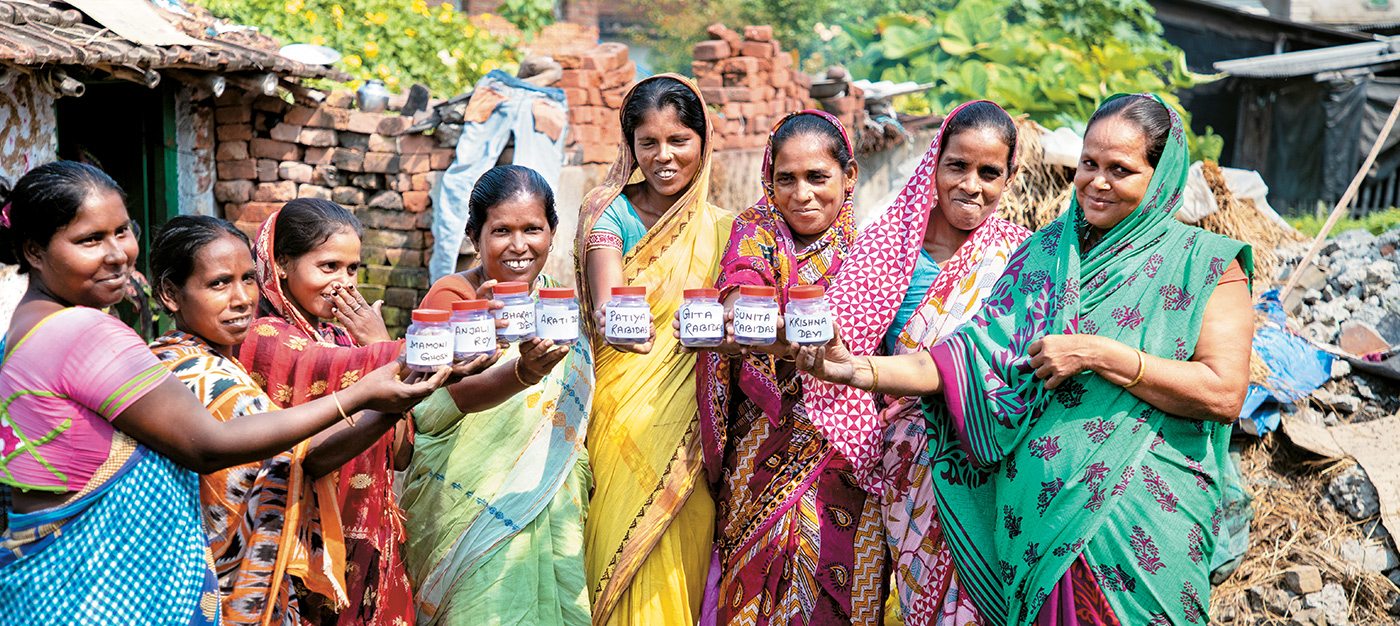
Bandhan:Beyond Banking
Bandhan Bank
Through its development programmes, Bandhan Bank aims to transform the lives of those who live at the lowest rung. The goal is to make them financially literate, self-sufficient, independent and organised so that they are part of the mainstream
Bandhan-Konnagar, registered under the West Bengal Societies Registration Act, 1961, was conceptualised in 2001 as an NGO to meet the dual objectives of women empowerment and poverty alleviation. The organisation started delivery of microfinance and development services. As microfinance activities grew, a Non-Banking Financial Company (NBFC) was acquired. This NBFC went on to acquire a universal banking licence and set up Bandhan Bank, without losing its core values.
The NGO, Bandhan-Konnagar, continued to focus on development work. It is today dedicatedly engaged in development activities which are aimed towards bettering the lives of the underprivileged. It shares similar values, ethos and philosophy with which Bandhan was born, has a social mindset and works towards making a significant contribution towards poverty alleviation. The endeavour of this institution is to broad-base the scope of services and minimise areas of income leakage in the not-so-privileged families. These development interventions are aimed at providing holistic support to the deprived community.
Bandhan Bank, through Bandhan-Konnagar, which is its implementing agency, is committed to expand its societal initiatives and focus on enhancing livelihood promotion, health, education and employment generation.
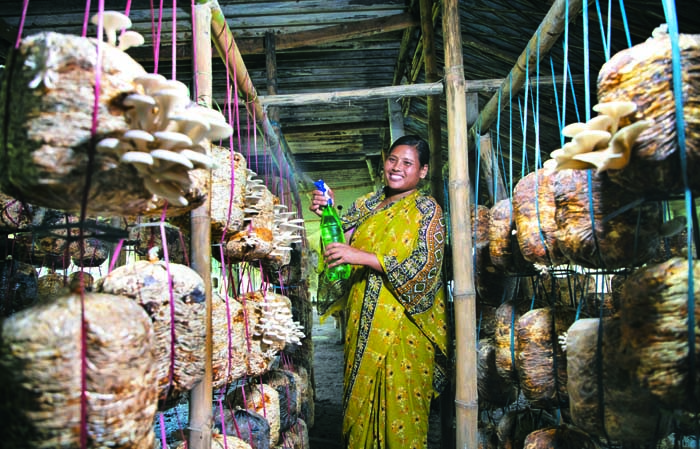
Mushroom farming has recently been introduced as an enterprise in West Bengal
This is a unique programme designed for the poorest of the poor. Grants (in the form of free assets, not cash) are offered to destitute women. They start generating income out of this asset and are consequently able to sustain their livelihoods. It is seen that within 18- 24 months of this grant intervention, these hardcore poor beneficiaries start to graduate, uplift themselves from extreme poverty and get linked to mainstream society.
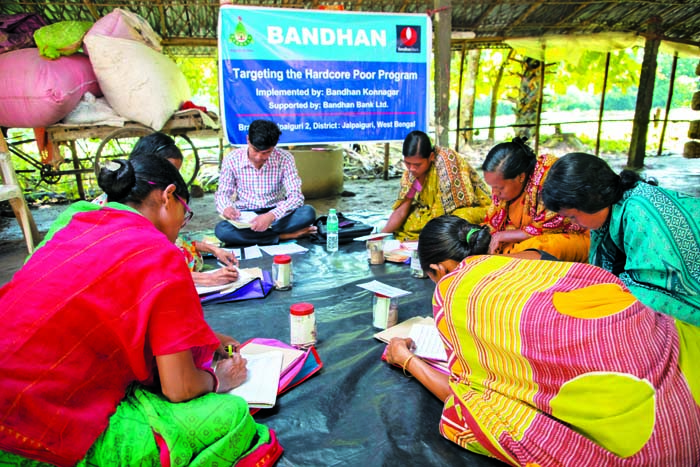
A training meet in progress for women in Jalpaiguri
This programme follows a 360-degree
approach. Besides providing free assets, consistent counselling and
mentoring support is also extended. A weekly subsistence allowance
(considerable amount of cash) is also given to these women to meet their
daily basic expenses until the assets begin to yield returns. Financial
literacy is imparted so that they can make informed financial decisions.
Education on socially relevant issues is also offered to increase their
awareness and help them live better lives. Overall confidence building is
done so that they don’t fall in the poverty trap again.
Over the years,
it has been seen that there is positive impact of this intervention in the
lives of many. There are certain beneficiaries who have moved from a stage
in life where they were even contemplating suicide for the want of money to
a position where they earn thousands of rupees as monthly income, have a
healthy life and are able to support all needs of their families.
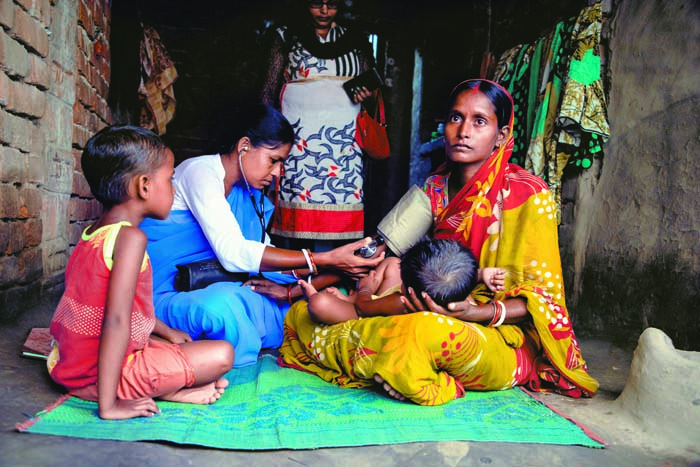
A Swasthya Sahayika (SS) checks the blood pressure of a young mother
This 24-month THP programme covers: beneficiary selection by participatory rural appraisal (PRA) and verification, provision of a productive asset, a temporary subsistence allowance, mandatory savings at bank, short-term training on enterprise management and confidence building, 18 months of weekly mentoring & monitoring and graduation training just prior to programme completion. This multi-dimensional approach empowers participants with confidence, enterprise development skills, and grant necessary to transform their lives and the lives of their families. A critical component of THP is Ati Daridra Sahayak Committee, which brings together influencers in villages to serve as guardians of these beneficiaries even beyond the programme period of 24 months.
The THP programme is operational across the states of Assam, Bihar, Rajasthan, Telangana, Odisha, Jharkhand, Uttar Pradesh, Uttarakhand, Madhya Pradesh, Chhattisgarh, West Bengal and Tripura.
One among the several beneficiaries of the THP programme is Krishna Devi who lives alone in her mud house in Chota Aliganj, Pakur. Her daughter is married and the 45-year-old used to earn a paltry sum of Rs 400 every month by cleaning the nearby temple. Sometimes, she also used to get food there. But now after the THP intervention, she goes with her wares to all the neighbouring areas to sell beauty products such as bangles, clips and the like. She has also become familiar with a few women and they arrange to meet in one home. She began with stock worth Rs 11,500, which has now gone up to Rs 22,000. Sometimes she walks, sometimes takes a bus and at other times a rickshaw, depending on the distance she is travelling. She has managed to buy a goat with her savings and has plans to breed and sell them as and when necessary.
Another beneficiary, Mampai Barman of Shobhabari, Jalpaiguri, is a widow and has one son. The 32-year-old lives with relatives and is now a mushroom grower. She was given 300 cylinders worth Rs.5,800 for mushroom cultivation. This is a new enterprise introduced in the area. The lady is happy with the results. Previously, she used to work as house help and earn only Rs.80 daily. Now, she sells mushrooms to the vegetable vendors in the neighbourhood and each kilo costs around Rs.60. She has also made a profit of Rs.8,000 and has savings too.
| States | Districts | Villages | Staff | No. of /beneficiaries/households | No. of women graduated out of extreme poverty |
|---|---|---|---|---|---|
| 12 | 53 | 4,002 | 1,080 | 97,075 | 69,940 |
This programme aims at increasing health awareness in order to reduce health expenditure of underprivileged families. It gives special focus on children under 5 years, pregnant women, lactating mothers and adolescent girls regarding safe motherhood, child nutrition, and sanitation issues. Under this initiative, health volunteers are developed by selecting interested women from the villages and providing them adequate training. These health volunteers called Swasthya Sahayikas (SS) then work in the villages to impart health education through regular health forums.
The core aspect of the health programme includes health education, which is imparted during health forums and doorstep counselling. The programme also includes linkage and referral services, distribution of health kits, setting up of water treatment plants to provide safe drinking water, providing basic healthcare service through its polyclinics and rural health centres, improving water and sanitation facilities, among others.
BHP works closely with families to make a real and lasting change in their behaviour. Through this programme, women are now increasingly patronising health services that is improving their lives, the well-being of their children and a visible change is seen in the economic stability of their households.
Globally, malnutrition among school-going children is a major public concern. Bandhan-Konnagar aims to reduce malnutrition amongst the rural kids in India. To achieve this, it helps households to practice kitchen gardening in their backyards to grow vegetables and fruits, thus enabling them to eat nutritious food and save money spent on buying these items from the market. This has resulted also in preventing vitamin deficiency and reducing the consumption of vegetables and fruits, which may contain higher percentage of chemical fertilisers, pesticides that are harmful to health.
BHP is operational across the states of Assam, Bihar, Chhattisgarh, Jharkhand, Odisha, Tripura, West Bengal and Rajasthan.
In Jhikarbasti, Pakur, Kapsi Kunai, a young mother of 25, is on her way to have a third child. Jharna Ravidas, a Swasthya Sahayika of the BHP, checks on her daily, measuring her weight, blood pressure and charting out her food plan. BHP ensures sustainability of healthy practices in the village. “Preeti is four years old and she was underweight. I recommended that she be given chaatu twice a day in addition to her regular meals. Now, I see her weight has gone up to 11 kg from 9 kg,” says Jharna.
| States | Districts | Villages | Staff | No. of health volunteers | No. of beneficiaries / household |
|---|---|---|---|---|---|
| 8 | 56 | 6,209 | 741 | 9,261 | 18,42,065 |
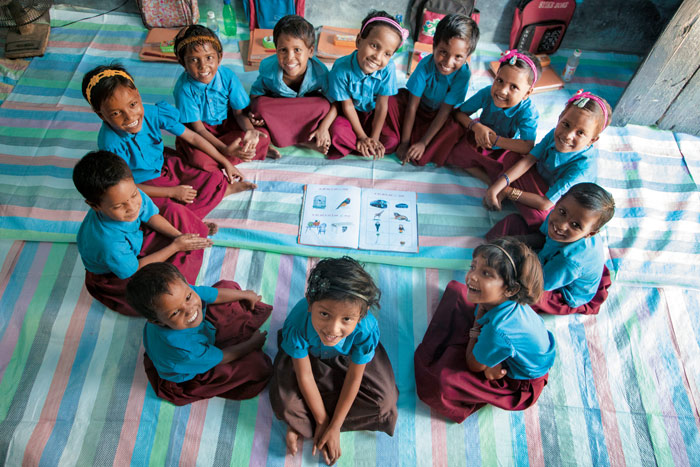
Children in the age group of 4-6 are educated through storytelling, rhymes
A large number of the rural population still remain illiterate. Simultaneously, a big percentage of children enrolled in primary schools are dependent on private tuitions, thereby leading to significant financial burden on the poor families. The organisation has tried to address this issue through setting up education centres, thereby aiming to ensure that all poor children in the community receive quality primary education. This programme encourages a diverse age group of underprivileged children to begin and sustain academics amidst a congenial environment. These aim to reach out to the children from economically constrained families with special focus on the girl child.
Bandhan Education Centres (BEC) which work like non-formal primary schools provide underprivileged children the opportunity to study and practice cultural activities, giving them a chance to make a strong foundation for themselves. The organisation has adopted a unique, low-cost, innovative model to ensure that children of deprived families are able to receive quality education.
Through this initiative, 1,16,348 children have been supported. They have been able to acquire good reading and writing skills and numerical abilities including sports and culture. Most children after completing schooling from BECs have secured admission in formal schools successfully. They are enjoying the learning process and most of them are excelling in their studies obtaining good grades.
Cultural programmes such as solo and group
songs, dance, recitation and short plays are organised every year at the Annual
Day function. These extracurricular activities are performed by the children of
Bandhan’s schools. Annual sports are also arranged to encourage the children to
participate in activities other than studies. The local authorities, elites of
the village, community members and parents are cordially invited to grace the
programme. A big turnout is seen at these events and this serves as a great
encouragement to the children. These activities lead to character-building of
the child and bring to the forefront their inner talents in their respective
areas of creativity.
BEP is operational across the states of Assam, Bihar,
Jharkhand, Tripura and West Bengal.
| States | Districts | Villages | Staff | No. of Education Centres | No. of beneficiaries / household |
|---|---|---|---|---|---|
| 5 | 35 | 2,106 | 339 | 3,775 | 1,16,348 |





A hospitality class in progress at the Bandhan Skill Development Centre, Siliguri
This programme is aimed at addressing the issue of unemployment in India. Vocational centres known as Bandhan Skill Development Centres (BSDC) are set up which provide training to unemployed youth. They can choose from an array of domains such as customer relations and sales, hospitality, information technology, business process outsourcing, computerised accounting, refrigerator and air conditioner repair, etc. After successful completion of these skill development courses, candidates either generate self-employment or find themselves reasonable employment with reputed companies like Pantaloons, Mainland China, Big Bazaar, Spencer’s, Godrej, HDFC Finance, Bajaj Finance, KFC and Café Coffee Day.
Each course has distinct objectives, contents broadly categorised as core skill, professional knowledge, professional skill and technical skill development under respective job roles. Sector specialists are consulted to refresh skills of the trainers and prepare course contents to make them up-to-date and relevant to industry environments. On-the-job training is organised at industry outlets/branches where participants learn practical work skills relevant to specific jobs.
Three to six months post-employment, the programme monitors the employment status and help the participants for their adaptability in the job. This procedure provides useful feedback and ensures security in employment for other young boys and girls too who are undergoing training at the centres.
EUP is operational across the states of West Bengal, Bihar, Madhya Pradesh, Odisha and Assam.
Sandhya Verma from Panitanki village, on the Indo-Nepal border, completed her BPO course but did not get a chance to prepare for the interview due to an emergency at home. So, she joined BSDC, Siliguri, to study and prepare for her interview.
Rupam Roy has joined the hospitality batch. He says, “My father is a farmer in Ambari, West Bengal, and I am really interested in becoming a hospitality professional. One of my friends completed his course from here and recommended this.”
Through the above mentioned programmes, the organisation has been able to transform the lives of lakhs of underprivileged and it is committed to scale up the impact created and the results generated on ground. The organisation intends to further expand its activities in the coming years in order to reach out to the unreached.